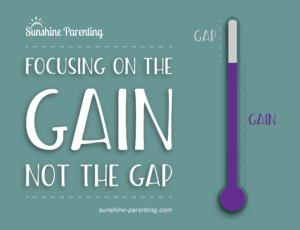Focusing on the Gain not the Gap
 Last week, I was listening to a podcast from one of my favorite leadership and motivational speakers (Michael Hyatt’s This is Your Life). Hyatt talked about the importance for business leaders to create an environment where small victories are celebrated and, when a goal isn’t reached, the leader encourages the team to celebrate the “gains” rather than lament the “gap.”
Last week, I was listening to a podcast from one of my favorite leadership and motivational speakers (Michael Hyatt’s This is Your Life). Hyatt talked about the importance for business leaders to create an environment where small victories are celebrated and, when a goal isn’t reached, the leader encourages the team to celebrate the “gains” rather than lament the “gap.”
According to Hyatt,
When we set big, challenging goals, it’s easy to see how far we have to go and lose our enthusiasm. We don’t want to persevere. We can start criticizing ourselves, maybe even procrastinating. Something I learned from my coach, Dan Sullivan, has helped me rethink the problem. Dan talks about measuring the gain, not the gap. For example, let’s say your goal is to write a book, lose weight, pay off debt, launch a business, or whatever. It can be daunting to look up and realize how far you still have to go. That’s the gap. You have to be careful that you don’t fall into the gap. Instead, what you do is look at the gain. See how far you’ve already come, and let your progress inspire your perseverance.
Gains are the positive changes that occur while striving for an ultimately unmet goal. The gap is the difference between where the team ended up and where they had planned to be. In most thriving companies, teams and individuals are striving for big, audacious goals (to use Good to Great lingo), and so, naturally, not all the goals will be reached.
When a team is working hard striving for a goal, it can be a downer not to actually reach it. But along the way of all that hard work and striving, some good things happened, right? Those good things wouldn’t have happened at all if the goal hadn’t been set in the first place. Rather than focusing on the failure to meet the ultimate goal, an inspiring leader focuses on the improvements and gains made while striving towards it. Celebrating the small victories and almost-met goals motivates people to strive for more.
When a leader dwells on the distance between where we are and where we wanted to be (the gap), that can undermine the future growth of the business. Employees who live in fear of being reprimanded for not meeting a lofty goal will naturally set the bar lower the next time. The more we focus on the negative or the gap, the worse everyone will feel – and perform.
But when we celebrate small victories and focus on the gains we have made, our team is encouraged to set really high goals and work hard to reach them.
As often happens in my thinking as both a camp director and a parent, I find parallels between positive business leadership practices, counseling and teaching skills, and parenting. A parenting article by Jessica Lahey called Parenting not for the Moment but for the Long Haul came across my feed the very same day I listened to Hyatt’s podcast and reminded me to use this gain and gap idea not only with my work team, but with the campers at camp and my own kids, too.
Said Lahey,
Children don’t take a direct path to adulthood; they wander. They are less concerned with our elaborate timelines and checklists than the fairy houses and climbing trees they spot along the side of the road. This June, as we race from concert to tournament to parent-teacher conference, get reacquainted with your rear-view mirror and look behind you for a moment. I promise: that grumpy, disorganized tween in the back seat, texting about her horrid, nagging mother and a C in Algebra, is going to be just fine.
I had coffee with a friend Friday morning, and we talked about applying the concept of gain and gap with our adolescent boys. Yes, ours tend to be forgetful, but we both concluded they are less forgetful today than they were a year ago. We celebrated the gains they made between ages 12 and 13!
We will just discourage our kids from staying on course and continuing to strive if we focus on and talk about their “gap” all the time. There will always be a gap – whether it’s in one subject area or a particular class or a social skill they struggle with. Our kids will not be excellent in every subject and activity and interaction (and if they are, we may be causing them some long-term mental health issues while demanding this kind of perfection).
When we raise kids by teaching them to celebrate how far they’ve come, they dream big, set goals, and work hard to reach them. Got a “C” on a math quiz? Was the last one a “D”? Let’s celebrate the gain achieved from meeting with the teacher and getting some extra help!
Didn’t quite get the race time hoped for in the final cross-country meet of the season? Well, how much did the time improve between the first race of the season and the final one? Let’s help our kids understand that the gains sometimes happen slowly. While we’re learning to take the long-view of parenting, let’s teach our kids to do the same.
 Whenever our child is working at something, there will be gains. And there will most likely always be a gap. My oft-used quote is, “Comparison is the thief of joy.” If we are constantly comparing ourselves to a standard of impossible perfection and focusing on the gap between where we currently are and where we want to be, we will never feel content or satisfied. But if we look back and see how far we’ve come, we can feel good.
Whenever our child is working at something, there will be gains. And there will most likely always be a gap. My oft-used quote is, “Comparison is the thief of joy.” If we are constantly comparing ourselves to a standard of impossible perfection and focusing on the gap between where we currently are and where we want to be, we will never feel content or satisfied. But if we look back and see how far we’ve come, we can feel good.
I remember learning of the concept of a “reverse bucket list” last year around this time. It was an excellent activity for me – a lifelong goal setter and striver – to list some things I had already done. Listing my life’s “gains” made me feel a lot better about some of the goals that I’m still striving for.
With my friend over coffee, we talked about continuing to apply this “gain/gap” idea to ourselves. Still haven’t lost those 5 pounds we planned to lose in 2016? Well, did we exercise more? Get more fit? Eat less sugar? If we’ve been striving towards being healthier, there are gains to celebrate. And by being more patient with ourselves, we’re also modeling an important skill for our children.
Change and growth take a lot of time, for our teammates at work, our kids, and ourselves, so it’s wise (and better for our mental health) to look at how far we’ve come and celebrate the gains, rather than lamenting where we still need to go.
Want to read more? Subscribe to my email list so that I can send you links to my weekly blog posts. I also post articles about parenting, connection, camp, and happiness on Facebook, Twitter, and Pinterest. I’d love for you to join me on my journey to creating a happier and more connected family.
Related/Resources:
Read “Parenting not for the moment but for the long haul,” by Jessica Lahey (NY Times)
Check out Michael Hyatt’s Website & Podcast:
https://michaelhyatt.com/persistence-to-reach-your-goals.html
